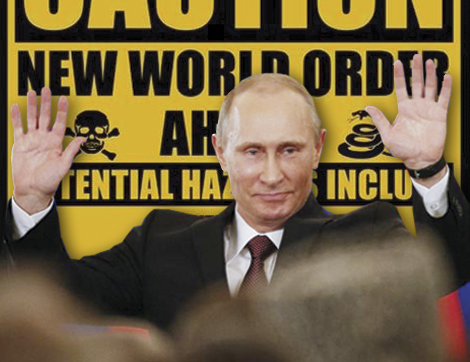
• Russia challenging “international system,” leaving one-worlders out in the cold.
By Mark Anderson —
In the wake of the late-April meeting of the Trilateral Commission (TC)—and with the 2014 Bilderberg meeting dead ahead in Denmark—globalists are fuming over Russia’s moves in the Crimea and its nationalist economic and energy initiatives.
Russia’s strong nationalist stance and its push for a “multi-polar” world system—rather than one dominated by the United States—suggest that Russian President Vladimir Putin is seeking a more decentralized world order. That may be embodied in Putin’s moves to negotiate trade and energy deals directly with Asian-Pacific nations, including Japan and South Korea, leaving the internationalists out in the cold. It is also reflected in Putin’s overtures to China.
Although it’s too early to forecast outcomes, a Russia that asserts itself independently on the world stage, with minimal linkages to Western power structures, means a world that could avoid having a singular source of ultimate authority.
This is why Secretary of State John Kerry told the Atlantic Council at a gathering in late April that Putin must be opposed simply because he is challenging “the international system.”
Western global expansionists lament that Putin refused to join the World Trade Organization. And various Western think tank policy papers show that Putin may be intent on forming a formal confederation, comprised of Russia and former Soviet states that are now in the loosely knit Commonwealth of Independent States. A confederation is a less centralized arrangement, comparable to Switzerland. The European Union is a federation, with a singular authority located in Brussels.
In contrast, Western corporate and banking interests support world government, an ultimate “unipolar” world with one super-concentrated central authority—a difficult goal that requires patient gradualism forged by the TC, the Bilderberg group and related secretive and semi-secretive Zionist-controlled outfits.
This is what is behind the Trilateralists’ support for a “Europe 2020” rubric consisting of a “fiscal union” among the 28 EU member nations. That means member states would have to completely surrender their autonomy to collect taxes and use the receipts for national public expenditures. Under a fiscal union such matters would be centralized, giving the EU direct control over taxation and spending power in direct contrast to state sovereignty where countries define their own fiscal policies.
The above fiscal item appears to harmonize with remarks this AMERICAN FREE PRESS writer chronicled at an April 2013 Brookings Institution meeting at which a Federal Reserve-style central bank for Europe was an announced goal.
Mark Anderson is roving editor for AMERICAN FREE PRESS. He will be in Denmark this year to cover the Bilderberg Meeting. Call 202-544-5977, Monday through Thursday, 9 a.m. to 4 p.m. ET, to see how you can help.


